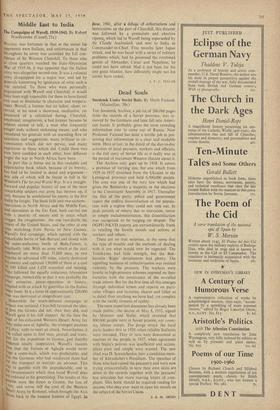Dead Souls
Smolensk Under Soviet Rule. By Merle Fainsod. (Macmillan, '50s.) THE Smolensk Archive, a job lot of 200,000 pages from the records of a Soviet province, was re- moved by the Germans and later fell into Ameri- can hands. It probably giyes the most revealing information ever to come out of Russia. Now Professor Fainsod has done a terrific job in pre- senting that information in a clear and readable form. Here at last, in the detail of the day-to7day activities of -local peasants, workers and officials, is the full story of Soviet life as it really was in the period of maximum Western illusion about it.
The Archive only goes up to 1938. It covers a province of varying size, but one which from 1929 to 1937 stretched from the Ukraine to the Leningrad province and held 6,500,000 people. The area was one of the very few which had given the Bolsheviks a majority in the elections to the Constituent Assembly in 1917. Thereafter the files of the party, police and government report the endless dissatisfaction of the popula- tion with a regime they could not vote out. In peak periods of misery due to starvation, terror or simple maladministration, this dissatisfaction was recognised to be verging on despair. The OGPU-NKVD reports are extraordinarily frank in retailing the hostile moods and actions of workers and others.
There are no true surprises, in the sense that the type of trouble and the methods of dealing with it are what would now be expected. The Trotskyites had little strength, but the Buk- harinite 'Right' deviationists had plenty. The appalling madness of collectivisation was resisted , violently by the peasants. The workers were hostile to high-pressure schemes imposed on their factories with the connivance of the so-called trade unions. But for the first time all this emerges through individual letters and reports on parti- cular villages and factories, clearer and fuller as to detail than anything we have bad, yet complex with the untidy ferment of reality.
The most important document has already been made public—the decree of May 8,.1933, signed by Molotov and Stalin, which revealed that 800,000 people were in Soviet prisons, not count- ing labour camps. The purge struck the local
party leaders first in 1929. when reliable Stalinists were intruded. They in turn, were denounced as enemies of the people in 1937, when agreement with Stalin's policies was iusufficient and accom- plices pure and simple were wanted. The new chief was D. Korotchenko, now a candidate mem- ber of Khrushchev's Presidium. The speeches of those who had ruined the peasantry and were now trying unsuccessfully to save their own skins are down in the records together with the peasants' less articulate but more moving letters of com- plaint. This book should be required reading for anyone who may ever want to open his mouth on the subject of the Soviet Union.
J. E. M. ARDEN


































 Previous page
Previous page